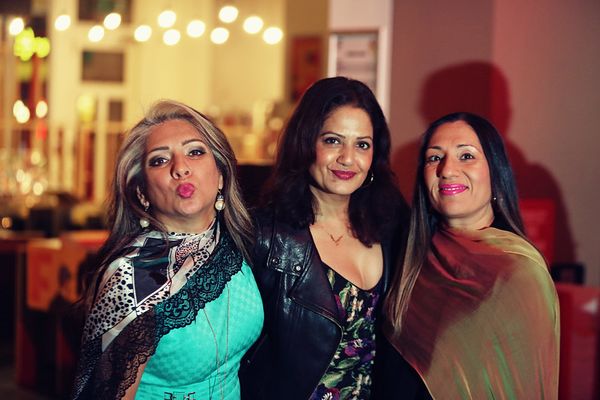 |
| Speaking out with Because We Are Girls at the Glasgow Film Festival Photo: Max Crawford |
The blues skies were back on Tuesday morning for day eight of the Glasgow Film Festival and a good thing it was too, as the queue for Andrej Tarkovsky’s haunting science fiction classic, Stalker. Those not attending the screening were slow to arrive at festival hub the GFT, as festival fatigue had clearly begun to set in, but there were still people planning to see four films in the course of the day and one member of the public was already on his twelfth of the festival.
 |
| Ingvar Sigurdsson in Glasgow Photo: Ingrid Mur |
Attendees were particularly buzzing about Arracht, the Irish tale of famine and other extremes which had caused ripples of excitement the previous night. There was a second chance to catch it on Monday afternoon, along with Icelandic comedy Pity The Lovers, Colombia psychodrama Luz: The Flower Of Evil and Slovenian/Italian fable Stories From The Chestnut Woods. The evening brought new delights, with Hirokazu Kore-eda’s Cannes hit The Truth winning a lot of new fans, brilliantly animated French dog story Marona’s Fantastic Tale triggering tears and elegantly staged but incredibly grim Ukrainian film Atlantis stunning its small but stalwart audience.
Among the highlights of the evening was Icelandic drama A White, White Day, which follows a man’s descent into darkness as he struggles to come to terms with the death of his wife and the possibility that she was having an affair – with a few comic touches along the way. “I love Glasgow,” star Ingvar Sigurdsson told me afterwards. “I love Scotland. I once shot a film up in the northest part of Scotland and I’ve been here once before so I’m very happy to be here again, and the audience was fantastic – a really, really good audience.”
There were some big hitters to catch in the late screening slot, including Ladj Ly’s César Best Film award winner Les Misérables and Mohaz Mohammadi’s heart-rending tale of family separation Son-Mother, plus Jorunn Myklebust Syversen’s scintillating Disco saw a pastor’s daughter question her faith after getting out on the dancefloor. Brazilian drama Bacurau proved to be an audience favourite - we interviewed directors Juliano Dornelles and Kleber Mendonça Filho about it last October and they were present after the screening to take questions from the audience.
 |
| Juliano Dornelles and Kleber Mendonça Filho in Glasgow Photo: Glasgow Film Festival |
The following morning that long queue was back again as fans lined up for the rare chance to see Terry Gilliam’s Brazil on the big screen. Each of these morning science fiction screenings is getting an introduction from festival co-director Allan Hunter which asks the question “Are we nearly there yet?” – some of which are stranger than others, but all of which invite the audience to reflect on the times we live in and what fiction once promised us. With news coming in during the day that more film festivals have been cancelled or changed because of Covid-19, the fear is that we could be in one of the darker timelines.
Science fiction remained a theme into the afternoon with the showing of spectacular style-over-substance space adventure Blood Machines – which, as some viewers pointed out, tried hard to do feminism but included an awful lot of naked breasts. Also showing at that time was black comedy Paradise, which looks at what happens when a man under witness protection finds himself in the same remote Alpine resort as the Mafia man he grassed up – along with several of the hits of the previous evening.
Wednesday evening brought the chance to catch the sweet and distinctly smarter than average romcom Olympic Dreams along with Agnes Joy, a frequently humorous drama about the interwoven lives of three generations of Icelandic women. Both were chosen by the festival’s youth selection team, which reflects a dedicated effort – now that the Glasgow Youth Film Festival has moved to a time of its own in September – to continue to ensure that there’s something suitable for all age groups at the main event, tough you won’t need to be young to enjoy them.
 |
| Greg Schroeder in Glasgow Photo: Glasgow Film Festival |
One of the treats of the evening was Ric Burns’ documentary Oliver Sacks: His Own Life, about the famed neurologist and author. Danish drama Resin looked at the strain felt in a family of hermits as a daughter started to claim her independence, and Nobadi seriously wrongfooted some members of the audience as its apparently heartwarming tale of a gruff old German man meeting a young Afghan refugee turned into something much more disturbing. Equally unsettling was documentary Because We Are Girls, about three Punjabi sisters growing up in Canada with a dark family secret. One of them, Jeeti Pooni, was in attendance alongside director Baljit Sangra, finally able to speak directly about her experiences.
While This World Won’t Break star Greg Schroeder delighted fans by travelling all the way from Texas, guitar in hand, for a screening of that film, the biggest excitement of the night inevitably centred on the Surprise Film, kept so secret that even festival staff were exchanging guesses as to what it might be. The first clue emerged when festival co-director Allison Gardner turned up to present it wearing pussycat ears. It was none other than Emerald Fennell’s Sundance hit Promising Young Woman, a ferocious revenge drama featuring Carey Mulligan as you’ve never seen her before, and although some audience members admitted that it was a bit much for them the general response was overwhelmingly positive, with several insisting that it’s a must-see. Our review of it will be coming shortly, along with numerous others, so stay tuned. With four more days to go, a lot can happen.





















